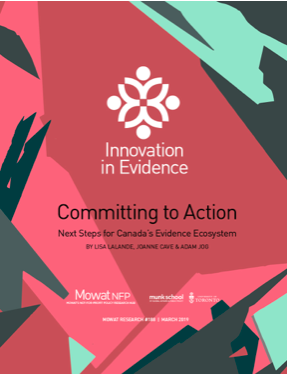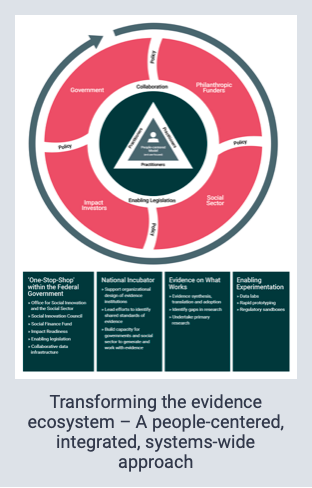- Home
- About Us
- The Team / Contact Us
- Books and Resources
- Privacy Policy
- Nonprofit Employer of Choice Award

 Today’s major social policy issues – from homelessness to early childhood development – rely on evidence-informed policies and practices to maximize impact. This much is already accepted by policymakers, practitioners and funders.
Today’s major social policy issues – from homelessness to early childhood development – rely on evidence-informed policies and practices to maximize impact. This much is already accepted by policymakers, practitioners and funders.
The current challenge is how to move from talking about using evidence to guide policy and practice, to actually doing it consistently – and well. In recent months, Mowat NFP, along with a number of partner organizations, has tackled this question in a major international conference held in Regina, two context-setting reports leading up to the conference, and a follow-up convening event in Toronto. The results of this project, along with comprehensive case studies analyzing promising examples, are presented in detail in a new report, Committing to Action: Next Steps for Canada’s Evidence Ecosystem. Below we present the key takeaways from this work.
Challenges and Promising Practices
If everyone agrees that placing social policy on an evidence-informed footing is so important, why does movement in this direction seem so slow? Our research found a number of key challenges, grouped under five major considerations. At the same time, experience from the UK, the US, and Canada highlights a number of promising practices that show how to overcome these challenges. ≈ Recommendations Our research underscores that strengthening Canada’s evidence ecosystem is an undertaking both ambitious and timely. Achieving this will require action by, and meaningful collaboration between, federal and provincial governments, philanthropic funders/research councils, social sector umbrella and intermediary organizations, and individual service delivery organizations. Relationships, trust, and meaningful engagement are a foundational element of any such action. Based on our research, we recommend a set of actions for each of these stakeholders to move Canada forward in transforming its evidence ecosystem.

Governments
Philanthropic Funders/Research Councils
Social Sector Umbrella and Intermediary Organizations
Social Sector Organizations
The Way Forward
The decisions made by social sector organizations, funders and policymakers can have a profound and lasting impact on people’s lives and the communities they live in. It is incumbent on all stakeholders to ensure these decisions are the best that they can be. Committing to action towards a stronger evidence ecosystem in Canada is the next step forward.
Mowat NFP undertakes collaborative applied policy research on the not-for-profit sector. As part of an independent think tank with strong partnerships with government and the sector, Mowat NFP brings a balanced perspective to examine the challenges facing today’s sector and to support its future direction. Mowat NFP works in partnership with umbrella organizations to ensure our research and policy recommendations are timely and relevant to the sector and reflect its values. You can read the full report here.